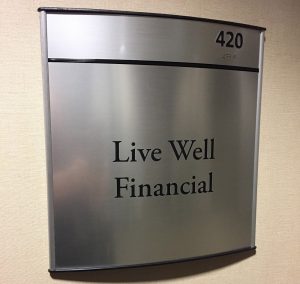One of the largest lenders of Chesterfield-based Live Well Financial has begun to chip away at the balance of the nearly $70 million it’s owed by the bankrupt mortgage local company.
Michigan-based Flagstar Bank this month won approval in federal bankruptcy court to take control of a $37 million bond account that Live Well had owned.
That account, held at U.S. Bank, had been used as collateral on a $70 million loan Live Well borrowed from Flagstar in 2017. Live Well defaulted on the loan in May, prior to its seemingly sudden collapse into bankruptcy, which was prompted by a petition from three of its largest lenders, including Flagstar.
While the Chapter 7 bankruptcy case put a freeze on Live Well’s assets until a trustee could sort out the mess, Flagstar continued to argue in court that it should have the right for a so-called relief from stay, arguing that it rightfully had a secured interest in the bond account.
A judge agreed, allowing the bank to essentially foreclose on the account, liquidate it and use the proceeds toward the $68 million balance that’s owed on the loan.
Flagstar’s beef with Live Well came to a head beginning in June, when it and two other lenders filed a petition aimed at forcing the company into bankruptcy. The three lenders claim they’re collectively owed $130 million by the company, which was founded in 2005 by Richmonder and former Capital One executive Michael Hild. The judge approved the petition in July, despite Live Well’s initial attempt to fend off the creditors and handle the bankruptcy process on its own terms.

Michael Hild (Submitted)
Flagstar also sued Hild, claiming he personally guaranteed the loans. Hild denies the allegations, claiming one of the two loans in question was repaid in June and that he never guaranteed the second note. Hild has asked to be dismissed from the case.
Meanwhile, Live Well’s bankruptcy case continues to play out in Delaware federal court. The company has yet to file a detailed list of its assets, liabilities and creditors.
Live Well was in the business of originating residential mortgages and reverse mortgages, and selling bundles of those mortgage into the secondary securities market. That model helped it become one of the fastest-growing companies in the Richmond area for a time.
While the company has offered little explanation publicly for its abrupt closure, which resulted in the laying off of more than 100 employees, court filings show it was cut off by its lenders, defaulted on loans and fell out of compliance with securities agreements with Fannie Mae and Ginnie Mae.
Court filings also state that Live Well and its representatives, including Hild, were the subject of investigations by the Securities and Exchange Commission. The FBI also had made inquiries into the company, court records state. No details of those investigations have been released.
One of the largest lenders of Chesterfield-based Live Well Financial has begun to chip away at the balance of the nearly $70 million it’s owed by the bankrupt mortgage local company.
Michigan-based Flagstar Bank this month won approval in federal bankruptcy court to take control of a $37 million bond account that Live Well had owned.
That account, held at U.S. Bank, had been used as collateral on a $70 million loan Live Well borrowed from Flagstar in 2017. Live Well defaulted on the loan in May, prior to its seemingly sudden collapse into bankruptcy, which was prompted by a petition from three of its largest lenders, including Flagstar.
While the Chapter 7 bankruptcy case put a freeze on Live Well’s assets until a trustee could sort out the mess, Flagstar continued to argue in court that it should have the right for a so-called relief from stay, arguing that it rightfully had a secured interest in the bond account.
A judge agreed, allowing the bank to essentially foreclose on the account, liquidate it and use the proceeds toward the $68 million balance that’s owed on the loan.
Flagstar’s beef with Live Well came to a head beginning in June, when it and two other lenders filed a petition aimed at forcing the company into bankruptcy. The three lenders claim they’re collectively owed $130 million by the company, which was founded in 2005 by Richmonder and former Capital One executive Michael Hild. The judge approved the petition in July, despite Live Well’s initial attempt to fend off the creditors and handle the bankruptcy process on its own terms.

Michael Hild (Submitted)
Flagstar also sued Hild, claiming he personally guaranteed the loans. Hild denies the allegations, claiming one of the two loans in question was repaid in June and that he never guaranteed the second note. Hild has asked to be dismissed from the case.
Meanwhile, Live Well’s bankruptcy case continues to play out in Delaware federal court. The company has yet to file a detailed list of its assets, liabilities and creditors.
Live Well was in the business of originating residential mortgages and reverse mortgages, and selling bundles of those mortgage into the secondary securities market. That model helped it become one of the fastest-growing companies in the Richmond area for a time.
While the company has offered little explanation publicly for its abrupt closure, which resulted in the laying off of more than 100 employees, court filings show it was cut off by its lenders, defaulted on loans and fell out of compliance with securities agreements with Fannie Mae and Ginnie Mae.
Court filings also state that Live Well and its representatives, including Hild, were the subject of investigations by the Securities and Exchange Commission. The FBI also had made inquiries into the company, court records state. No details of those investigations have been released.





They still have NOT filed a lists of assets and liabilities?? Even with a business Chapter 7, a meeting of the creditors to review the initial lists of assets the company has comes 14-21 days after a filing. I wonder if they have anything left to report or anyone to report it??
Michael Dodson –Do you think this will eventually go to where they got the money for all the Hilds have in Manchester?
If I were the Trustee, I would seek an order to prohibit the sale, transfer, and/or encumbrance of any real property tied to the officers of Live Well and its subsidiaries. Especially considering the criminal case against the company that is underway and that some of the civil filings mention RICO violations.
Michael – where did you see mentions of RICO?
Active suit Edmond v. Live Well, albeit you can sue for anything you want if you have the money.
FBI appears to be going after the bank fraud route.